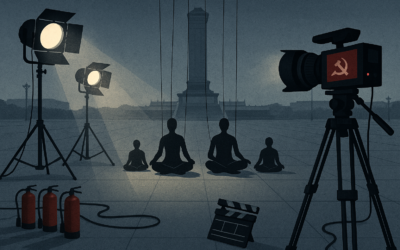Experts from the U.N. agency say the virus could not have originated from a Chinese laboratory—because the Chinese told them so.
by Massimo Introvigne

Unbelievable. But not unexpected. The experts of the World Health Organization (WHO), a United Nations agency often accused of being friendly to China, went to Wuhan and concluded that the theory that the virus leaked accidentally from one of the local virus research laboratories is not believable. While non-Chinese experts who argued that the laboratory theory cannot be dismissed as conspiratorial, including those from the French authoritative National Center for the Scientific Research, based their findings on an analysis of the virus, the WHO merry travelers simply believed what the Chinese told them.
Dr Peter Ben Embarek, the Danish expert leading the WHO team, said in a press conference that he came to his conclusions through interviews with Chinese managers and scientist working in the Wuhan laboratories. These discussions, Ben Embarek said, wee “long, frank, open.” The Chinese told him the story of “both present and past and all projects involving bats and coronaviruses and more advanced projects,” He added that “he questioned WIV officials extensively about what they thought of the lab leak hypothesis,” they denied it, said that safety at their laboratories works perfectly, and “they’re the best ones to dismiss the claims and provide answers to all the questions.”
Honestly, this is a scandal, and it is even more scandalous that respectable international media are taking Ben Embarek seriously. Not only did he visit a possible crime scene more than one year after the crime was suspected to have occurred, he asked the suspect whether s/he committed the crime, and accepted “no” for an answer. Perhaps next time the WHO will visit Russia, ask the secret services whether they poisoned Alexei Navalny, have a “long, frank, open” discussion with them, and report that they said no, they don’t deal with poisons, and “they’re the best ones to dismiss the claims and provide answers to all the questions.”
There is worse. Ben Embarek is by trade a food safety expert, and the fact that he was appointed, in agreement with the Chinese, head of the WHO inspection team, clearly indicated that the result was pre-determined. The WHO had already agreed to support the Chinese claim that the virus originated from food, either from wild animals sold in the Wuhan market or, as the CCP very much prefers, from frozen food that came to Wuhan from the United States, Norway, or Italy.
To his and the WHO’s shame, Ben Embarek did his press conference with Liang Wannian, leader of the Chinese side of what was after all China-WHO joint team, who, unchallenged by the WHO representative, continued the CCP propaganda about “contaminated food” coming from abroad.
Weighing in on Chinese media, Zeng Guang, a chief scientist at the Chinese Center for Disease Control and Prevention, argued that the virus after all may have originated in a laboratory—an American laboratory, that is. Zeng accused the United States of multiple “crimes” in manufacturing and using biological weapons, implying they may have created also the virus responsible for COVID-19.
The world has tolerated for too long the farce of Chinese and WHO “experts” peddling propaganda reminiscent of Stalin’s trials against scientist accused of dealing in the very poisons that were used by his secret services. It is great time to stop taking these “experts” seriously.

Massimo Introvigne (born June 14, 1955 in Rome) is an Italian sociologist of religions. He is the founder and managing director of the Center for Studies on New Religions (CESNUR), an international network of scholars who study new religious movements. Introvigne is the author of some 70 books and more than 100 articles in the field of sociology of religion. He was the main author of the Enciclopedia delle religioni in Italia (Encyclopedia of Religions in Italy). He is a member of the editorial board for the Interdisciplinary Journal of Research on Religion and of the executive board of University of California Press’ Nova Religio. From January 5 to December 31, 2011, he has served as the “Representative on combating racism, xenophobia and discrimination, with a special focus on discrimination against Christians and members of other religions” of the Organization for Security and Co-operation in Europe (OSCE). From 2012 to 2015 he served as chairperson of the Observatory of Religious Liberty, instituted by the Italian Ministry of Foreign Affairs in order to monitor problems of religious liberty on a worldwide scale.



